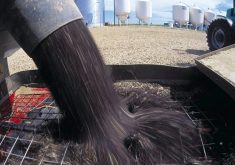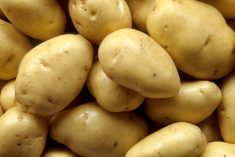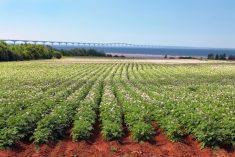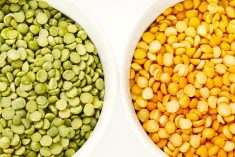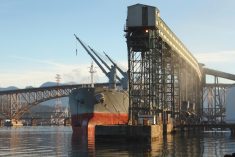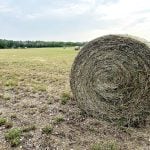The federal Conservatives want to see a clearly defined end zone for the Canadian government’s suspension of Prince Edward Island potato exports to the U.S.
The Canadian Food Inspection Agency on Monday announced the suspension of certification for P.E.I. potato exports to the U.S., — a move which, according to federal Agriculture Minister Marie-Claude Bibeau, was imposed at the request of U.S. officials on threat of a ban coming from the U.S. side of the border.
Read Also

Alberta harvest wrapping up: report
Harvest operations advanced to 96 per cent complete in Alberta as of Oct. 7, with only a few late-seeded cereal and canola fields remaining, according to the latest provincial crop report.
U.S. Agriculture Secretary Tom Vilsack said Tuesday the suspension followed the confirmation in October of potato wart in two processing-grade potato fields in P.E.I.
“Our risk assessment demonstrated that this action is necessary to protect U.S. potato producers from possible exposure to… potato wart,” Vilsack said at the time.
U.S. officials, he said, would work with CFIA as the Canadian agency “delimit(s) the infestation and trace(s) the sources so that appropriate mitigation measures can be imposed and trade restrictions relaxed.”
The suspension of certification announced Monday applies on table stock potatoes and processing potatoes, but won’t apply to already-processed potatoes, such as frozen products, CFIA has said.
Former federal ag minister Lawrence MacAulay, one of the province’s four members of Parliament, said Tuesday the U.S. had “made clear that they would immediately ban the importation of P.E.I. potatoes if we did not take action.”
The U.S. stance, he wrote on Twitter, “clearly goes beyond what we feel is necessary — indeed, it’s absolutely unfair to our farmers on P.E.I. — but given the reality of the situation, the decision we took is the best way for us to resolve this as quickly as we possibly can.”
“In classic Liberal fashion, this ban was made in the middle of the night, with no consultation, and no plan to support the workers impacted by this decision,” the opposition Conservatives’ agriculture critic John Barlow said in a separate release Wednesday, noting the “lack of details” provided so far to affected potato growers.
Thus, Barlow said, the Conservatives called on the Liberals to “immediately release a plan to support P.E.I. potato farmers and give these workers a date for when the ban will be lifted.”
Barlow took the issue directly to Prime Minister Justin Trudeau in the House of Commons Thursday, criticizing the government for not consulting the P.E.I. government or affected farmers on the matter and asking him to reverse the “crippling, self-imposed ban.”
Trudeau replied the government is “obviously extremely concerned,” adding he brought up the matter directly with U.S. President Joe Biden the previous week in Washington and the government was working to make clear to U.S. officials that there’s “no scientific basis” for a ban.
In the meantime, imposing a voluntary suspension was meant “to prevent the Americans from bringing in something that would have been much more difficult to reverse,” Trudeau said.
MacAulay, writing on Twitter Tuesday, echoed that statement, adding that “letting the Americans implement their own ban would mean this unfortunate situation would last much longer.”
Speaking Thursday in the Commons, Barlow also chastised the four Liberal MPs representing P.E.I., stating they “haven’t said a single word about this decision.”
P.E.I. Premier Dennis King, in a separate statement Thursday, said he’s “in contact daily with our Island MPs and appreciate their unwavering support for the agriculture industry in Prince Edward Island in fact.”
Those MPs, King said, “are working hard, both here in P.E.I. and in Ottawa with Minister Bibeau as we know that a resolution to this current situation will only be found through a co-ordinated and unified effort.”
Domestic management
The U.S. Department of Agriculture’s Animal and Plant Health Inspection Service (APHIS), in a follow-up statement Thursday, cited the detection of potato wart in two separate P.E.I. potato fields last month and “a confirmed detection on a separate P.E.I. farm in 2020.”
Those detections, APHIS said, “indicate that the organism is present in areas not previously known to be infested.”
However, the P.E.I. Potato Board, in a separate statement Tuesday, said the two fields where potato wart was detected last month were already under regulation as part of the Long-Term Potato Wart Domestic Management Plan developed by CFIA — meaning they were already known to be linked to a previously infected field.
That means the potatoes grown on those fields “were already ineligible to be shipped to any market outside of Prince Edward Island, including the United States and Canada,” the board said.
Before last month’s findings, potato wart had appeared in 33 fields in P.E.I. since October 2000. After a months-long ban on P.E.I. potato exports to the U.S., a system was put in place in 2001 allowing exports from lower-risk zones where the fungus hasn’t been detected and where the same equipment wasn’t used.
Under that plan, table and processing potatoes admitted from P.E.I. to the U.S. were also required to be cleaned and treated with sprout inhibitors.
While not considered a human health or food safety risk, potato wart is known to drag on crop yields and can make potatoes unmarketable by ruining their appearance.
The soil-borne disease has never been seen in any other Canadian province except Newfoundland and Labrador, where it’s been under “regulatory control” since 1909.
U.S. officials said this week the disease “is not known to be present in the United States.” The disease was first confirmed in the U.S. in 1918 in Pennsylvania and later in West Virginia and Maryland. It was later deemed eradicated in all three states, the last being Maryland in 1994. — Glacier FarmMedia Network





